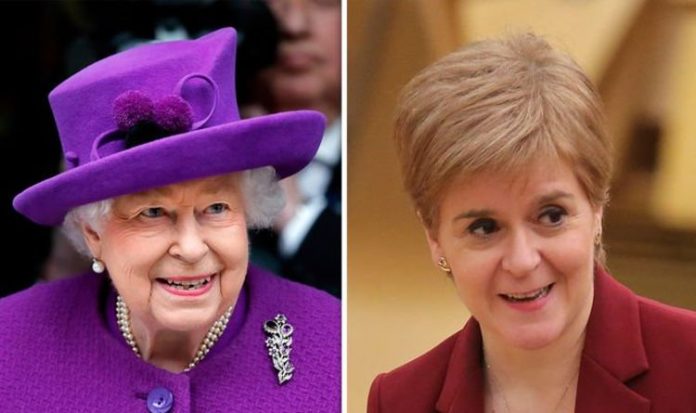Nicola Sturgeon ‘won’t compromise on independence’ says expert
Scottish First Minister Nicola Sturgeon is pushing for a second referendum on Scottish independence as a result of Brexit changing the political landscape. While the SNP leader is currently focused on shaping Scotland’s response to the coronavirus pandemic, she has said the UK Government’s position on Indyref2 is unsustainable. During the first referendum, Buckingham Palace insisted the Queen does not want to influence the result, saying it is “a matter for the people of Scotland”.
That said, the Queen’s love for Scotland is well-known and she is said to be happiest when she is at Balmoral Castle in Aberdeenshire.
The Queen holidays at Balmoral and spends a week every year at Holyrood Palace in Edinburgh, the official residence of the British monarch in Scotland.
Prince Philip, Prince Charles, Prince Andrew and Prince Edward all went to boarding school in Scotland.
The Royal Family also has Scottish tiles ‒ Prince Charles carried the title Duke of Rothesday, while Prince William and Kate are known as the Earl and Countess of Strathearn.
However, Scottish nationalists are split on whether the Queen should continue being the head of state in an independent Scotland.
READ MORE: ‘Spikey’ Sturgeon backlash as SNP urged Kate and Will to cancel trip

Queen Elizabeth II and SNP leader Nicola Sturgeon (Image: GETTY)

Pro-independence supporters march through Glasgow on route to the BBC Scotland in 2014 (Image: GETTY)
Former First Minister Alex Salmond is a monarchist himself, and always maintained the Queen could be “Queen of Scots” if the country voted to leave the Union.
He stressed the Royal Family’s deep historical links to Scotland and how the union of the Crown predates the union of Parliaments.
The Queen herself said she would be “proud” to be the monarch of an independent Scotland before the first referendum.
However, as the vote drew near in 2014, then-Prime Minister David Cameron, worried that the vote might not go the way he wanted, asked the Queen to intervene.
Four days before voters went to the polls, the Queen made a rare statement, telling a well-wisher outside Crathie Kirk that she hoped the Scottish people would “think very carefully about the future”.

Former First Minister Alex Salmond supported the Queen continuing as head of state of Scotland (Image: GETTY)
Naturally, the comment received widespread press coverage and was welcomed by No campaigners.
Many people who support the Union felt that the Queen, as the symbol of the UK as a whole, may have injected some patriotism into the debate.
On the other hand, Yes campaigners argued that the Queen should stay neutral on all political matters and that it was not her place to speak about this.
Mr Cameron, who admitted in 2018 he asked the Queen to intervene said: “It was certainly well-covered, although the words were very limited, I think it helped to put a slightly different perception on things.”
Mr Cameron, who was campaigning himself for the Union to remain together, admitted in a two-part BBC series about his premiership entitled ‘The Cameron Years’ that he asked if the monarch would “raise an eyebrow” in support of the Better Together campaign.
DON’T MISS
Princess Eugenie ‘waited for Beatrice’s wedding’ after Meghan row [INSIGHT]
Queen and Philip’s Windsor Castle heartbreak on wedding anniversary [REVEALED]
Prince Charles ‘sneaks up on Princess Anne’ in touching footage [VIDEO]

David Cameron asked the Queen to intervene (Image: GETTY)
He did this because he was worried the Yes campaign might win after a poll 11 days before the vote put them in the lead for the first time.
The former Prime Minister explained that he communicated with the Queen’s private secretary about how she might be able to show her support for the Union.
He had been staying at Balmoral when the poll findings were revealed in a Sunday newspaper and he said the result was like a “blow to the solar plexus” that led to a “mounting sense of panic that this could go the wrong way”.
He said: “I remember conversations I had with my private secretary and he had with the Queen’s private secretary, not asking for anything that would be in any way improper or unconstitutional, but just raising the eyebrow even you know, a quarter of an inch, we thought would make a difference.”
Queen’s Platinum Jubilee: Andrew Rosindell details plans
While Mr Salmond is keen for Her Majesty to be the Queen of Scotland in the event of a vote to leave the Union, the Royal Family’s role has been questioned by some pro-independence campaigners.
Dennis Canavan, who was chair of the Yes Scotland campaign back in 2014, said he favoured a referendum on who should be the head of state.
Members of the Radical Independence movement ‒ a coalition of activists on the left ‒ also wanted to be able to have a republic in Scotland.
A YouGov poll at the time found 54 percent of Scots were in favour of keeping the monarchy if Scotland voted to leave, with 39 percent wanting it scrapped.
Among SNP voters, this narrowed to 46 percent compared with 39 percent.
Although these figures indicate the Queen is still largely supported in Scotland, there are also more sceptics of the monarchy than in the UK as a whole.
Even if the Queen were to remain the head of state, her role could change in Scotland, as the new independent country would be able to lay out a new constitution.
Professor Robert Hazell, director of UCL’s Constitution Unit, said the Queen’s duties would “depend on the role provided for head of state in Scotland’s new written constitution.”







